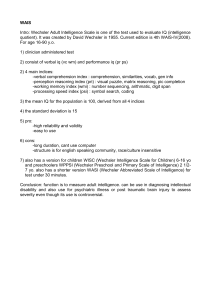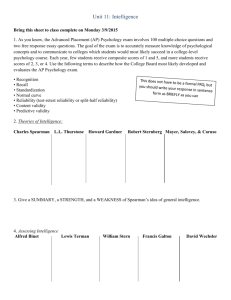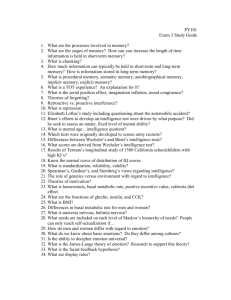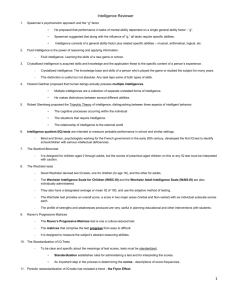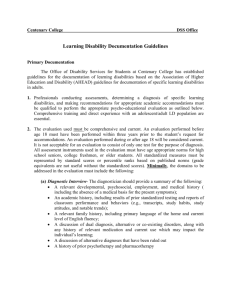STUDY GUIDE - Thinking, Language and
advertisement
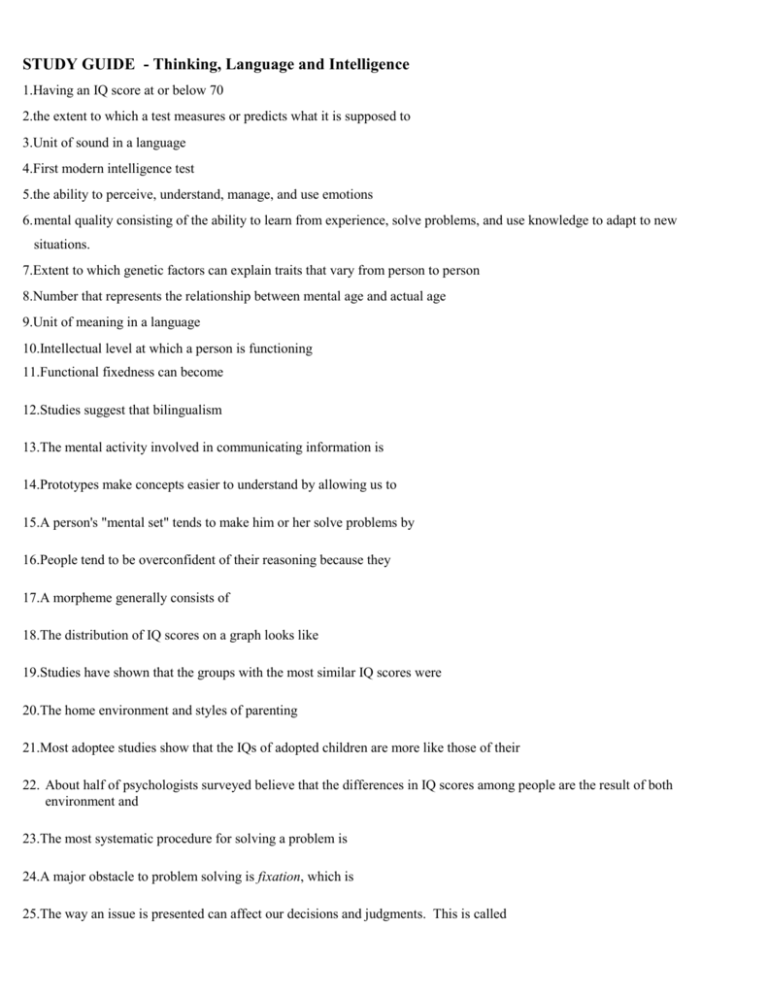
STUDY GUIDE - Thinking, Language and Intelligence 1.Having an IQ score at or below 70 2.the extent to which a test measures or predicts what it is supposed to 3.Unit of sound in a language 4.First modern intelligence test 5.the ability to perceive, understand, manage, and use emotions 6. mental quality consisting of the ability to learn from experience, solve problems, and use knowledge to adapt to new situations. 7.Extent to which genetic factors can explain traits that vary from person to person 8.Number that represents the relationship between mental age and actual age 9.Unit of meaning in a language 10.Intellectual level at which a person is functioning 11.Functional fixedness can become 12.Studies suggest that bilingualism 13.The mental activity involved in communicating information is 14.Prototypes make concepts easier to understand by allowing us to 15.A person's "mental set" tends to make him or her solve problems by 16.People tend to be overconfident of their reasoning because they 17.A morpheme generally consists of 18.The distribution of IQ scores on a graph looks like 19.Studies have shown that the groups with the most similar IQ scores were 20.The home environment and styles of parenting 21.Most adoptee studies show that the IQs of adopted children are more like those of their 22. About half of psychologists surveyed believe that the differences in IQ scores among people are the result of both environment and 23.The most systematic procedure for solving a problem is 24.A major obstacle to problem solving is fixation, which is 25.The way an issue is presented can affect our decisions and judgments. This is called 26.The one-word stage of speech development is usually reached at about 27.According to Noam Chomsky, we ___________ to learn the grammar rules of language. 28. There is much controversy over whether apes can be taught to use language in the way that humans do. However, most researchers agree that apes can 29.The existence of savant syndrome seems to support 30.Which of the following is NOT a characteristic of a creative person? 31.Emotionally intelligent people are characterized by 32.The intelligence quotient, or IQ, of a 6-year-old with a mental age of 6 would be 33. The Stanford-Binet, the Wechsler Adult Intelligence Scale, and the Wechsler Intelligence Scale for Children are known to have very high reliability. This means that 34.To say that heritability of intelligence is about 50 percent pmeans that 50 percent of 35.The experience that has the clearest, most profound effect on intellectual development is 36.Overestimating the accuracy of one's beliefs or judgments is called 37. If you use a/an ____________ to solve a problem, you will always get the correct answer, but sometimes it takes longer than when you use a/an ____________, which may not produce the correct answer. 38.The mental activities associated with thinking, knowing, remembering, and communicating is called 39. The older a person is when emigrating to a new country, the harder it is to learn the language. This best illustrates the importance of ________ for learning language. 40.A tendency to search for information that confirms our preconceptions is called 41.Allen and Beatrice Gardner of the University of Nevada (Reno) trained a chimp named Washoe to 42.The one-word stage of speech development is usually reached at about 43.The sudden realization of the solution to a problem is called 44.Which of the following is an example of the one-word stage of language development? 45. Most people incorrectly think that it is riskier to fly on an airplane than it is to travel in a car, partly because they can easily think of airplane crashes they have seen on TV. These people are being affected by 46.Once we learn one language

